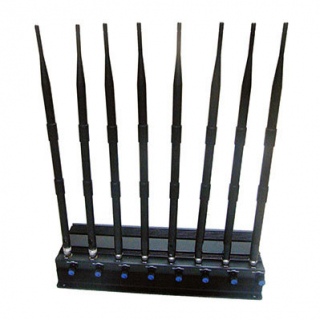Texas beauty school’s need with 5W adjustable cell phone jammer?
A 5W adjustable cell phone blocker was acquired by a cosmetology school just outside Dallas to ensure tranquility in the classrooms. This move, coupled with the school's possession of three more jammers yet to be activated, initiated a series of developments that unfolded last week.
Phonejammer.com, headquartered in London, has been on the FCC's radar for quite some time. In 2008, the agency issued a citation to Phonejammer (PDF) due to their marketing of radio frequency devices specifically created to intentionally interfere with cellular and PCS frequencies in the United States.
The company claimed not to be marketing these products in the US, where they are illegal, but FCC staff highlighted that the signal blocker
were priced in US currency, the default shipping location was set to the United States, and the site contained testimonials from US citizens who had purchased phone jammers from Phonejammer. Moreover, the jammers on the site were designed to target US cellular and PCS frequencies.
While you may suspect that the federal government's concerns about your business practices would necessitate changes, this is not the case for Phonejammer. On November 9, 2009, the Federal Communications Commission (FCC) received a complaint, likely from AT&T, regarding cellular interference in the 800MHz and 1900MHz frequency bands. The FCC's Texas field office staff conducted an investigation and determined that the Cosmetology Career Center in Carrollton, Texas was responsible. They found a 5W jammer on the premises (PDF).
Upon contact from the FCC, Phonejammer's lawyer asserted that the company has not shipped or distributed any units to the United States.
Priced at $395, the 5W jammer operated by the Cosmetology Career Center comes with two antennas and a jamming radius of 2-25m. It is capable of blocking PCS, GSM, and CDMA signals between 850MHz and 2100MHz. The website specifies its "operating location" as South America and Africa.
Interestingly, individuals in Texas and Florida are legally allowed to openly carry firearms into a Starbucks, whereas the use of phone jammers is prohibited. As a result, when confronted with a loud cell phone conversation at a nearby table, the only choices are to endure the disruption or consider using a firearm. This situation highlights potential shortcomings in current public policy frameworks.
Phonejammer.com, headquartered in London, has been on the FCC's radar for quite some time. In 2008, the agency issued a citation to Phonejammer (PDF) due to their marketing of radio frequency devices specifically created to intentionally interfere with cellular and PCS frequencies in the United States.
The company claimed not to be marketing these products in the US, where they are illegal, but FCC staff highlighted that the signal blocker
were priced in US currency, the default shipping location was set to the United States, and the site contained testimonials from US citizens who had purchased phone jammers from Phonejammer. Moreover, the jammers on the site were designed to target US cellular and PCS frequencies.
While you may suspect that the federal government's concerns about your business practices would necessitate changes, this is not the case for Phonejammer. On November 9, 2009, the Federal Communications Commission (FCC) received a complaint, likely from AT&T, regarding cellular interference in the 800MHz and 1900MHz frequency bands. The FCC's Texas field office staff conducted an investigation and determined that the Cosmetology Career Center in Carrollton, Texas was responsible. They found a 5W jammer on the premises (PDF).
Upon contact from the FCC, Phonejammer's lawyer asserted that the company has not shipped or distributed any units to the United States.
Priced at $395, the 5W jammer operated by the Cosmetology Career Center comes with two antennas and a jamming radius of 2-25m. It is capable of blocking PCS, GSM, and CDMA signals between 850MHz and 2100MHz. The website specifies its "operating location" as South America and Africa.
Interestingly, individuals in Texas and Florida are legally allowed to openly carry firearms into a Starbucks, whereas the use of phone jammers is prohibited. As a result, when confronted with a loud cell phone conversation at a nearby table, the only choices are to endure the disruption or consider using a firearm. This situation highlights potential shortcomings in current public policy frameworks.

コメントを書く...
Comments